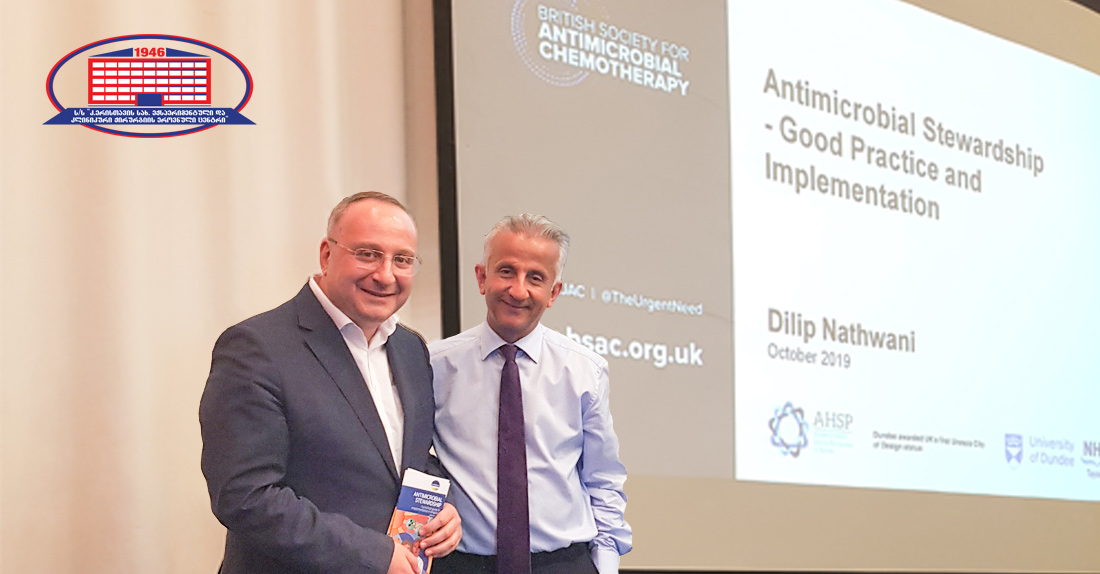
On the 2nd of October, a close-up meeting on "Antimicrobial Resistance" was held at Radisson Blu Iveria Hotel.
Following heads of National Center of Surgery attended the event “Antimicrobial Resistance in Georgia”:
- Founder of company “Aversi” – Paata Kurtanidze;
- Director-General of National Center of Surgery – Lasha Bazadze;
- Clinical Director of National Center of Surgery – Nikoloz Chaduneli;
- Director of the clinic “New Life” of National Center of Surgery – Zviad Martiashvili;
- Clinical Manager of the clinic “New Life” of National Center of Surgery – Nino Gasviani.
Doctors of the clinic and representatives of the Ministry of Internally Displaced Persons from the Occupied Territories, Labour, Health and Social Affairs of Georgia were also invited to attend the presentation.
With the support of the European Bank for Reconstruction and Development, a project was developed for the Company "Aversi" and Medical Corporation "Evex," which comprises trainings, meetings, and action plans on antimicrobial resistance. Within the framework of the project, the clinics were evaluated on existing conditions of clinical microbiology and infections and foresaid event was dedicated to close-up meeting and concluding presentations on antimicrobial resistance of microorganisms.
The main speakerof the event was Prof. Dilip Nathwani, professor of the University of Dundee and Academic Health Science Partnership of British Scientific Center. Mr. Nathwani’s speech was dedicated to a general overview of antimicrobial resistance program, central points of the meeting, and future strategy.
We’d like to remind our readers that a few months ago, within the framework of the program, Mr. Nathwani visited National Center of Surgery and gave a presentation on topics such as the importance of improving quality of antimicrobial management in the clinics, overview of susceptibility indicator of antibiotic resistance in humans, emphasis on measures against antibiotic resistance and so on.
According to Professor’s statement at the event held at National Center of Surgery, the antimicrobial strategy is based on the following:
- Improving treatment of infectious diseases;
- Reducing the risk of spread of infection during surgical operations;
- Minimizing the number of diseases and mortality rate;
- Caring for patient safety;
- Treating antibiotic-resistant infections is quite financially costly. The program aims to balance healthcare cost, so it doesn’t increase uncontrollably amid maintenance of high quality. Based on the case of a specific clinic, guests had an opportunity to witness the effectiveness of the program and the fact that it’s possible to improve antimicrobial strategy even without a large amount of money.
Moreover, he cited an example of meta-analysis that overviewed 77 different studies and following were reported:
- The antibiotic rate was reduced in 91% of the cases;
- Financial saving was achieved in 100% of the cases;
- The duration of antibiotic therapy was reduced in 6 papers.
What does the “Antimicrobial Resistance” mean?
Antimicrobial resistance means that microorganisms became unresponsive to antimicrobial drugs i.e., drugs that were initially effective in the treatment of infection caused by microorganisms, today do not deliver desired results.
Of course, with the discovery of antibiotics, doctors have cured numerous diseases that caused death years ago, but nowadays, because of increased competitive effect and in most cases, the resistance of bacteria, fungi, viruses and parasites, numerous antimicrobial drugs might be of no benefit.
Before the prescription of antimicrobial drugs, it’s necessary to conduct culture. It’s an effective method for selection of right course of treatment and prevention of antimicrobial-resistance strains' formation.
Laboratory plays an important role in antimicrobial program.
It should be mentioned that resistance of microbes poses a serious threat to the contemporary world.
Every patient should comprehend the following:
- Exposure to antimicrobial drugs is recommended only with doctor’s recommendations;
- Discretionary discontinuation of antibiotic therapy (treatment with antimicrobial drugs) isn’t recommended;
- You should strictly follow the doctor's instructions on the dosage and frequency of antimicrobial exposure.
Wish you health!









